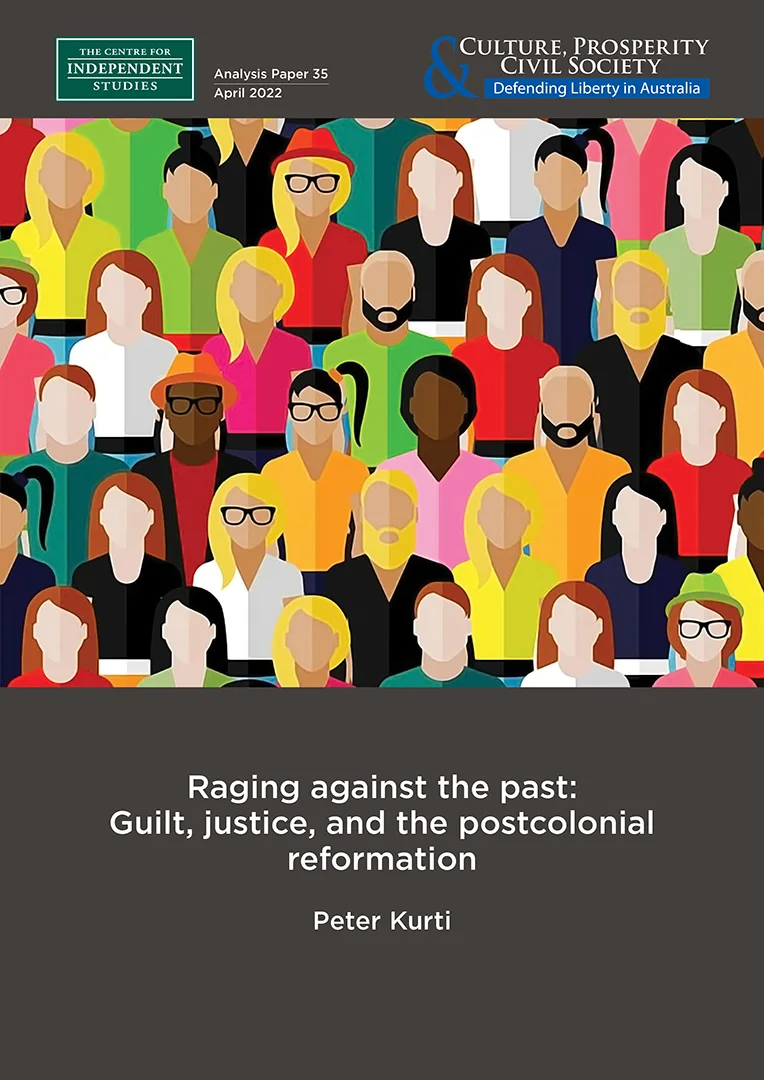
Postcolonial Theory wages relentless campaigns of reformation against Enlightenment conceptions of reason, tolerance, and liberty. It does this in the name of redressing the immorality of the past. But this reformation, which weaponises history, poses real dangers that threaten the integrity of intellectual and historical enquiry because it is fuelled by the postmodern idea that knowledge is always a construct of power. Postcolonial Theory poses a serious threat to the intellectual and cultural integrity of Australian society. It does so by virtue of fostering an impoverished and revisionist form of historical enquiry marked by an obsession with power, oppression, and the primacy of ‘lived experience’. Postcolonial Theory’s dangerous pursuit of an unattainable, millenarian vision of the perfectly just society imposes an increasingly heavy burden on the citizens of Western liberal democracies, such as Australia.
Introduction: decolonising history
In June 2020, the Australian winter was marred not only by Covid-19 but by an unrelated, determined vandalism of statues commemorating notable figures in the country’s history. Statues vandalised in towns and cities around the country included representations of Captain James Cook, Captain James Stirling, Governor Lachlan Macquarie, and former prime ministers, John Howard and Tony Abbott.
In the judgment of the vandals, each statue depicted a figure whose opinions, political views, or historical roles were deemed to dishonour or demean aspects of Australian identity — especially any that concerned Indigenous Australians. As such, statue-toppling protesters ruled that history had to be corrected and the stigma of colonialism and invasion eradicated.
Overseas, a similar stigma has perhaps attached most conspicuously to the legacy of Cecil Rhodes. Protests against Rhodes drew some support in Australia – where many prominent Australians have enjoyed Rhodes Scholarships at the University of Oxford. However, they have been particularly vigorous in Southern Africa, where Rhodes made his fortune, and at institutions with which he was associated in the United Kingdom, one of the most notable being the Oxford University, itself.
The Oxford campaign against statues or memorials commemorating Rhodes broadened to become a series of campaigns for reform of university curricula, appointment of non-white teaching staff, and eradication of racial discrimination. Organisers of the Rhodes Must Fall in Oxford (RMFO) campaign sought to raise awareness of the university’s implication in colonialism, describing itself as:
A movement determined to decolonise the institutional structures and physical space in Oxford and beyond. We seek to challenge the structures of knowledge production that continue to mould a colonial mindset that dominates our present.
But campaigns against colonialism, and against Rhodes in particular, have attracted criticism. “The campaigners are treating history as moral therapy, claiming that memorials of those with different values reinforce their sense of oppression,” argues Anthony Lemon.
Another critic is Oxford theologian and ethicist, Nigel Biggar, who has warned against an overly simplistic assessment of Cecil Rhodes and his legacy which is far more complex than allowed by activists. “The truth about the past, and the duty to do justice to it, is of no interest at all [to activists],” Biggar remarks. “History is merely an armoury from which to draw politically useful weapons.
Destruction of statues commemorating James Cook, Lachlan Macquarie, and Cecil Rhodes, among others, represents one manifestation of ‘decolonisation’ campaigns sweeping Western countries — and those in the Anglosphere, such as Australia, in particular. These campaigns, which purport to express moral concern about colonialism, became pronounced throughout the 1960s, especially on university campuses, where critics of colonialism opposed what they perceived to be efforts by colonial powers to protect their economic and political interests.
Decolonisation is described by Helen Pluckrose and James Lindsay, trenchant critics of decolonisation activism, as “the systematic undoing of colonialism in all its manifestations and impacts.” They argue that “the collapse of colonialism was at the heart of the social and political milieu in which postmodernism arose.” Decolonisation activists no longer see history as a means of pursuing empirical truth, but as a weapon with which to achieve certain political objectives. In broad terms, these political objectives fall within the scope of an area of enquiry known as ‘Postcolonial Theory’.
This paper argues that, as an applied form of Critical Theory, Postcolonial Theory corrupts a society’s conception of itself.
Postcolonialism and the decline of empire
Disengagement from empire in the 20th century by countries, such as Great Britain, was coupled with the emergence of nationalist movements and the language of liberation in countries that were former colonial territories.
Some scholars have argued that the processes triggered by disengagement have created what are sometimes referred to as “enduring issues.”v Postcolonial Theory is to be understood as a form of corrective response to these “enduring issues”. As George Steinmetz has remarked:
Postcolonialism is an investigation into the ways colonialism continues to shape former colonies and a new set of approaches to understanding historical colonialism. [It] understands itself as coming into existence in a historical dusk period in which an empire’s decline has not yet been accompanied by a lessening of its cultural power.
In broad terms, when postcolonialism is described as a consequence of the historical process of the decline of empire, the term ‘empire’ is used to signify the imposition of political and legal control over a subject people.
Postcolonial ‘truth’ about Australia
Postcolonial Theory attempts to describe the complex of historical processes marking the decline of ‘empire’, that is, the decline of historical structures that impose political and legal control over a subject people. As such, Postcolonial Theory asserts that problems faced in an earlier age are inherited and persist today.
In the case of Australia, Postcolonial Theory generates interpretations of the present that are often thoroughly distorted, leading to condemnation of the country as being for ever, and irredeemably, racist. This distorted representation of contemporary Australia conflicts directly with the country’s widely recognised status as a cohesive, multicultural society. Nonetheless, the annual assault upon Australia’s national holiday which falls in January, Australia Day, is a good example of the ideological conflict that Postcolonial Theory provokes.
Postcolonialist attacks on Australia Day
Both the concept and the celebration of Australia Day have long been markedly controversial amongst decolonisation activists. Opposition to commemorating Australia Day focuses on the forms of injustices believed to flow from the actions of a conquering, colonising power that arrogated to itself sovereignty over a conquered territory.
For example, some demand the substitution of ‘Invasion Day’ for Australia Day. Others propose changing the date despite 2017 polling showing that 54 per cent of respondents were not in favour of changing the date as opposed to 26 per cent who did favour such a change.
It is reasonable to assume that those in favour of retaining the date are neither blind nor indifferent to the disadvantages – often severe – endured by Indigenous Australians. Rather, they accept the need to strive for continuous efforts to improve the well-being of all citizens of this country.
However, in the view of such critics, it is appropriate neither to observe the day itself nor to celebrate the existence, achievements, and liberties of the nation of Australia. They argue that the legacy of the past negates both the reality of the present and hopes for the future.
Postcolonial Theory wages relentless campaigns of reformation against Enlightenment conceptions of reason, tolerance, and liberty. This is because the zeal for reformation extends to everything that the West stands for — and all in the name of redressing the immorality of the past. But this reformation, which weaponises history, poses real dangers that threaten the integrity of intellectual and historical enquiry because it is fuelled by the postmodern idea that knowledge is always a construct of power.
Postcolonial Theory as a model of historical enquiry is neither objective nor concerned merely with analysis and criticism. It is, instead, a radical form of activist postmodernism which Pluckrose and Lindsay call, “applied postmodernism”:
[Postmodernists] are obsessed with power, language, knowledge, and the relationship between them. They interpret the world through a lens that detects power dynamics in every interaction, utterance, and cultural artefact — even when they aren’t obvious or real.
Scepticism about the possibility of objective truth, and insistence that knowledge is legitimised by forms of linguistic discourse, give rise to a profound paradox lying at the heart of applied postmodernism. The paradox is that, while asserting the objective truth of the proposition that knowledge is socially constructed, Critical Theory (upon which the critique offered by Postcolonial Theory is based) is unable to justify that the assertion is, itself, objectively true.
As discussed in the mid-2021 CIS paper, Cancelling the Culture: Critical Theory and the Chasm of Incoherence, applied postmodernism asserts with absolute certainty that knowledge is socially constructed and that power hierarchies are oppressive. Power hierarchies must therefore be challenged by changing the language with which they are described, thus changing the knowledge.
The question of how we think about the past is an important one. But Postcolonial Theory is marked by a fundamentalist obsession with the dynamics of power and knowledge, and employs a distorting, oversimplistic dichotomy between ‘oppressed’ and ‘oppressor’. Emerging from Postcolonial Theory, decolonisation programs aim at overturning – or ‘decolonising’ – what are deemed dominant and oppressive discourse, attitudes, and mind-sets.
Having evolved in university lecture halls and seminar rooms, largely in the United States of America, the contagion of Postcolonial Theory escaped from the campus and spread to other countries, including Australia, where it infects our own national sense of identity. For example, Isabella Saunders, an Australian postcolonialist scholar, argues that despite progress made in pursuit of Indigenous rights, Australia has yet to complete its process of decolonisation — in virtue of securing land rights and Indigenous recognition — and therefore cannot yet properly describe itself as a ‘post-colonial nation’:
If the term post-colonial implies that the nation has undergone decolonisation, and the previously occupied group of people are no longer subjugated to control and limited agency, then Australia is realistically quite far from that objective. While the progressions made throughout Indigenous history have restored many rights to Aborigines, particularly in the way of land rights and social and political activism, the Indigenous voice is still lacking in many discussions nation-wide.
Notwithstanding Saunders’ contention that Australia is not a ‘post-colonial’ nation, other Australian postcolonial theorists, such as Anne Hickling-Hudson, nonetheless argue that postcolonial theory is of particular value in education. This is because it allows for a deconstructive approach to interpreting and understanding cultural conflict:
Restructuring education from a postcolonial perspective will not change the hegemony of international capitalism and the harm that it does to cultural, social and physical environments. But it might help people to build the cultural strength to challenge and tackle these problems.
However, this paper argues that Postcolonial Theory poses a serious threat to the intellectual and cultural integrity of Australian society. It does so by virtue of fostering an impoverished and revisionist form of historical enquiry marked by an obsession with power, oppression, and the primacy of ‘lived experience’.
Dangers of postcolonial revisionism
There are two significant dangers that revisionist postcolonial accounts of so-called ‘power relations’ pose and to which critics must be alert:
1. Danger 1: The burden of guilt can never be discharged
Postcolonial Theory holds that today’s generation of contemporary Australians continues to bear guilt and always bears a moral responsibility for deeds perpetrated in an earlier age of our history. Today’s Australians are guilty in perpetuity.
2. Danger 2: The standard of justice is impossible to attain
Postcolonial Theory insists on attaining a standard of justice that will redress the moral omissions of that earlier age. But this standard of justice is a utopian ideal that calls for unobtainable perfection. Redemptive justice is always beyond reach of today’s Australians.
This paper does not deny that history confronts contemporary Australia — as it does every nation — with events and actions that need to be considered and addressed. But it does argue that the claims Postcolonial Theory makes about the legacy of the past, the attribution of guilt, and the realisation of justice are unwarranted, unsustainable, and corrode social cohesion.
How did we get here? The rise of Postcolonial Theory
Grounded in Critical Theory, Postcolonial Theory is a form of postmodernism which holds that forms of knowledge deemed ‘Western’ are especially oppressive. According to Postcolonial Theory, the ‘West’ has given priority to science and the exercise of reason, and devalued all forms of ‘non-Western’ knowledge, in order to strengthen its own hold on power over those deemed non-scientific and non-rational.
‘Western’ ways of knowing are exemplified in such subjects as science, mathematics, literature, and history, which are all deployed in ways intended to perpetuate the ongoing exercise of forms of ‘colonial’ power and influence by the West. In their place, postcolonial theorists propose reformed curricula of studies that displace anything that smacks of colonial or imperial hegemony. What has taken the place of such displaced subjects? The answer, according to CIS Adjunct Scholar, Fiona Mueller, in her reports about the degraded teaching of English literature in Australian schools and universities is unsettling:
Courses in postcolonial literatures, Australian literature, women’s writing, creative writing, and literary theory. A student majoring in English literature would have a very limited knowledge of the history of British literature in English, and the English language. Those who teach works from the traditional canon of English literature are often suspected and accused of being complicit in some way with the moral depravity at the heart of Western society.
Postcolonial Theory demands that ‘colonial’ ways of knowing must be deconstructed and devalued – that is, decolonised. It is no longer enough simply to identify imbalances of power: they must be equalized by deconstructing ‘Western’ ways of knowing and replacing them with ‘Eastern’ ways, or forms of knowledge. This is why Postcolonial Theory, decolonisation, and rejection of Western ways of knowing, feature so prominently – and controversially – in primary, secondary, and tertiary educational institutions.
The foundations of this are found in Edward Said’s influential positioning of ‘Orientalism’ as “a Western style for dominating, restructuring, and having authority over the Orient.”
He argued that Orientalism is “a system of ideological fiction” which both misrepresents and falsifies non-Western cultures for the political purposes of domination, exploitation, and control.
Said’s work of deconstructing the alleged hegemony of the West has been enormously influential in shaping the development of Postcolonial Theory in its applied forms, with postcolonial theorists reading the Orientalism concept into texts, systems and processes, in their search for evidence of power imbalances between dominant and oppressed cultural groups. On the basis of what they claim to discover, they recast history from the perspective of the oppressed. For the postcolonial theorist, knowledge and history are always made; as such, for the purposes of reclaiming an imposed discourse, they can be – and must be – remade.
Postmodern principles inform Postcolonial Theory
Two key principles, identified by Pluckrose and Lindsay in their analysis of postmodernism, inform the practice of Postcolonial Theory:
• The postmodern knowledge principle is radically sceptical about the possibility of objective knowledge. Truth is held to be a representation of a cultural framework and, as such, is determined by that culture.
• The postmodern political principle holds that society is formed of systems of power and hierarchies that decide what can be known, and how, and which serve their own vested interests. This, in turn, gives rise to an ethical imperative to challenge and deconstruct all such oppressive structures.
Postcolonial theorists arm themselves with these two principles and set out upon a new and radically sceptical, revisionist way of thinking about the past. In doing so, they eschew the notion of objective, empirical truth, and insist that knowledge is conditioned by power, especially power as exercised through the use of language.
Historical revisionism leads postcolonial theorists to pursue a series of political objectives while dismissing the need for any of those objectives to be warranted from the weighing of empirical evidence. As asserted by Dalia Gebrial, a postcolonial theorist using language characteristic of postcolonial analyses of history:
This epistemological insistence upon history as a positivist endeavour functions as a useful tool of coloniality in the institution, as it effaces the power relations that underpin what the ‘production of history’ has thus far looked like.
Revisionist postcolonial accounts of these ‘power relations’ pursue two key objectives:
i. to demonstrate that today’s generation continues to bear guilt and, therefore, a moral responsibility for the deeds of an earlier age;
ii. to impose on today’s generation a certain conception of justice whereby the moral omissions of that earlier age can be redressed.
However, these objectives are thoroughly misconceived and, as this paper argues, threaten to distort the processes of scholarly historical enquiry.
Raging against the past: who is guilty?
Postcolonial Theory insists that guilt for actions perpetrated in the distant past is ineradicable and is transmitted from one generation to another in perpetuity.
Therefore, a contemporary issue, both pressing and moral, is the extent to which citizens of a country should assume responsibility for wrongs perpetrated by their state, whether those wrongs were committed in the recent or distant past.
In Australia, for example, the political project of ‘reconciliation’ with Indigenous Australians depends upon the extent to which contemporary Australian society is willing both to assume and acknowledge such responsibility – and to respond to the sufferings of those who were wronged. This is the very issue that goes to the heart of contested arguments about the morality of celebrating events such as Australia Day.
One scholar who has addressed the problem of “the faultlines and conflict that characterise relationships between indigenous people and settler states”, such as Australia, is Australian social scientist, Sarah Maddison. While noting the significance of Australia’s efforts to address historical injustice – such as the 1967 referendum, approving amendment of the Constitution to allow the Commonwealth to make laws for Aboriginal people and include them in the census, the formal recognition process, and the 2008 apology extended to the Stolen Generations by Prime Minister Kevin Rudd – Maddison argues there are deeper issues that remain to be addressed:
There are significant social psychological barriers caused by internalised social norms as well as socio-historical context and interaction to achieving the kind of reconciliation that settler/indigenous alienation would seem to demand, and that actions such as those outlined above aspire towards.
Maddison argues that these “psychological elements” can best be understood as comprising a form of “collective guilt”. But the burden of this guilt is such as to impede acknowledgement of the extent of the wound inflicted on Indigenous Australians which, in turn, makes it much harder to develop healthy contemporary social relationships.
A determination to avoid repetition of those wrongs may be thought to depend, in part, upon sincere public expressions of apology and remorse. However, repeated public expressions of apology, alone, do little to address existing social and economic hardship endured by some indigenous Australians, especially those living in remote communities. Apologising for the past is morally vacuous if it does no more than attack the historical record while leaving untouched injustices of today. Nonetheless, postcolonial rage against the past is frequently marked by intense emotion.
Contemporary Australians need to be able to respond effectively to the challenge this emotion presents. They must also weigh the extent to which contemporary citizens of Australia, many of whom came as migrants, can be held responsible for actions perpetrated after settlement in 1788. As historian and lawyer, Jonathan Sumption, has remarked, what has happened has happened:
When we castigate the sins of our forebears as immoral, we are saying, implicitly, that there are some moral principles that are absolute and eternal, not relative and ephemeral, by which men [sic] may justly be condemned in any age.
The problem with this view, Sumption observes, is that the existence of such eternal moral principles that are independent of changing human understanding depends upon a source or revelation for them other than humans themselves. “But revelation is not a very useful tool for conducting a discourse between generations separated by a gulf of understanding several centuries wide.”
Sumption rejects as indefensible the concept of collective and inherited guilt. He also rejects the concept of historic apology for wrongs committed in the distant past as both an historical anachronism and as morally incoherent because “we simply perpetuate the sense of grievance by making it heritable.”
The past must be reckoned with — something that Sumption readily acknowledges. But it is also important to recognise that the principles we value today were not equally admired by our ancestors. This means that we must not invest history with a moral value it is not capable of bearing:
We have a duty to understand why things happened as they did, but apologising for them or trying to efface them is morally worthless. It gets in the way of understanding. Once the relevant actors have left the scene, there is no longer a live moral issue. For those left behind, there are only lessons to be learned.
If Sumption is correct, attempts in 21st century Australia to efface wrongs perpetrated in the early days of colonial settlement are surely a morally worthless bid to discharge a burden of guilt that can never be discharged. The relevant actors have long left the scene. But is the burden of guilt different in circumstances in which the relevant actors have not left the scene and may still be lurking in the wings?
This important question was analysed with particular perspicacity by Karl Jaspers in the context of the challenge faced by post-Second World War Germany in rebuilding its society (see Box 4).
Karl Jaspers and the question of guilt
Jaspers drew a distinction between collective guilt, which imputes blame without regard to the actions or intentions of individual citizens, and collective responsibility, which arises from the duties accompanying citizenship. In this sense, responsibility cannot be evaded even though guilt may not be attributable.
Jaspers proposed four categories of guilt which he applied in order to analyse and address the question of German guilt:
i. Criminal guilt: this is attributable to those who violate the law and who have been convicted by a court with legitimate jurisdiction. Criminal guilt is not collective but attaches to the individual criminally convicted.
ii. Political guilt: this belongs to all citizens of a state who must bear equal responsibility for the way in which they are governed. Political guilt is collective in that all citizens of the state are unavoidably liable for the kind of state they create.
iii. Moral guilt: this identifies the personal responsibility a person bears in their own conscience for their action or inaction. Moral guilt arises in the individual who has the capacity both for self-examination and repentance for actions done or left unperformed by virtue of personal choice.
iv. Metaphysical guilt: this identifies the responsibility a citizen feels towards the suffering and death endured by others. Jaspers even uses religious language to describe this category of guilt because he argues that it “results in a transformation of human consciousness before God linked with an indelible sense of guilt which grows modest before God.” Jaspers might also be speaking here of the religious concept of ‘sin’.
Jaspers attempted to differentiate those situations in which an entire people can be judged from those in which only an individual alone can be judged. Even when all citizens of a country can be held liable for actions taken by the state, Jaspers is adamant that their liability is definite and limited even though it can extend to those who opposed the state and its actions.
However, he is equally clear that all human activity, all human life, happens within groups, communities, and societies. Our existence within those communities requires choice, action, and inaction, and these behaviours can lead, in turn, to individuals being implicated in the actions of others.
This common existence will also implicate individuals in the consequences of those actions (even when they choose not to act) and, therefore, in a guilt that would not otherwise be theirs. It is because of the interconnectedness of human society that the notion of collective guilt arises.
Collective guilt attributable to a nation is something that can only be experienced by the individual citizens of that nation as individuals. Jaspers rejects the idea of the collective as something over and above the individual. It is for each individual to face their own experience of guilt if they are to have any hope for what Jaspers calls ‘purification’. Purification can come about, in part, through awareness of wrong-doing and through action; but it is also an active and ongoing process of engaging with feelings of guilt in order to attain the liberty that comes about through transformation.
The question of German guilt arose in very specific circumstances but the attempts to formulate an answer to it continue to have application in situations, such as South Africa, where the perpetrators of injustice, and those they persecuted, continue to live side by side in a society that had been bitterly divided by past wrongs. Although the challenge is immensely complex, attempts to address guilt – both individual and collective – and to effect reconciliation have important implications for the political development of a society, even in one that remains divided.
However, in Australia, where the perpetrators of 18th and 19th century acts of ‘colonialist oppression’ have long since left the scene, it is difficult both to conceptualise guilt and to identify how the burden of that supposed guilt can be discharged.
Yet Postcolonial Theory is obsessed with guilt. It insists that successive generations of Australians continue to bear guilt for all actions and behaviours judged to be wrong – such as invasion, conquest, and slavery – that were perpetrated in a previous era, no matter how distant that era may be from the present. Moreover, it also insists that these wrongs can only ever be addressed by eradicating all vestiges of association with that era, whether in the form of literature, the fine arts, statuary, the curriculum, and language.
The burden of guilt lies like a heavy yoke across the shoulders. And, as political scientist, Andrew Schaap, has remarked, guilty subjects make poor citizens because their individual experience inhibits their capacity to participate in the society to which they belong:
Guilt, like other self-regarding sentiments, limits a person’s capacity to respond politically: that is, to think representatively, to imagine the world from a plurality of perspectives, and to judge and act based on a particular opinion that claims [communal] validity.
In contexts such as post-war Germany or post-apartheid South Africa, the kind of metaphysical, or collective, guilt identified by Jaspers can contribute to the emergence of a new, civic commitment on the part of all citizens to build a new society.
In the case of slavery, by contrast, something neither practised nor endorsed in any modern contemporary society, guilt is wrongly attributed to the citizens of Western liberal democracies. This is because Postcolonial Theory conflates guilt with responsibility and fails to distinguish them from one another. Those Western countries that engaged with slavery did profit from it as a commercial practice, but they also committed long ago to its abolition.
Britain abolished slavery in the early 19th century. From 1833, the British Royal Navy fought against slavery both within the territories of its own Empire and beyond. There is nobody alive today to whom guilt or responsibility for that historic slave trade can be attributed because nobody alive today was involved with it. But Postcolonial Theory assumes guilt, and accordingly attributes responsibility. It thereby devalues both.
Even though the charge of slavery has frequently been levelled at Australia for its imported, indentured labour, no instance of the use of such labour falls within internationally accepted definitions of slavery. The efforts of postcolonial activists who focus on such historical figures as Cecil Rhodes would bear greater moral worth if they were directed to those countries where slavery continues to be practised, a point made emphatically by historian David Daintree:
Historically, slavery has been an almost universal practice and one extremely difficult to eradicate. In the matter of slavery, what nation has clean hands? Horrifyingly, UN agencies estimate that there are still 40 million slaves in the world today, three times as many as were transported from Africa to the New World in the infamous Middle Passage.
But about this, Postcolonial Theory is strangely silent — almost certainly because those countries where slavery is practised today are not European but rather the victims of historic European colonial activity. Their status as ‘victims’ appears to exonerate them from all moral blame for any of their contemporary social practices, no matter how heinous.
Condemnation in the name of ‘justice’
Postcolonial Theory’s drive to deconstruct the West, and to purge it of all perceived vestiges and manifestations of colonialism, is fuelled by a determination to achieve a perfected form of justice for the supposedly ‘oppressed’. Only by overturning the interests of the privileged and powerful, in whatever form they are deemed to be expressed, can the reformers of Postcolonial Theory redress the legacy of enduring grievance.
Postcolonial Theory holds that language is a principal vector for the transmission of injustice. As Pluckrose and Lindsay remark, a key assumption of Postcolonial Theory is that “there must be permanent problems that have been handed down to us through language constructed long ago.” However, this pursuit of justice is informed by a form of conceptual fundamentalism that takes no account of the natural, evolving relationships that occur between individuals and communities — the components of society.
In Australia, postcolonial protests about ‘injustice’ are most frequently directed at effacing the impact of settlement after 1788 and at redressing the enduring grievance of Indigenous disadvantage. However, the means postcolonial activists select to redress the very real social and economic disadvantage endured by many Indigenous people do little to alleviate that disadvantage. They prefer, instead, to pursue justice by means of adopting — or changing — symbols, such as the national flag, the National Anthem, or the Australian Constitution. These symbols represent ‘permanent problems’; addressing the ‘problems’ must begin with addressing the symbols.
Yet the conceptions of justice and the just society pursued by Postcolonial Theory offer no concrete proposals for how any ‘just’ order might be established. In pursuit of the ‘perfect’ manifestation of justice, Postcolonial Theory tears down any institutional manifestation of what it deems ‘injustice’ without giving any consideration to the actual society that might emerge as a result of this destruction. But achievement of justice cannot — and must not — depend upon imposing an uncompromising and zealous vision of the perfectly just society.
The idea of a just society
One of the characteristics of a functioning liberal democracy, such as Australia, is the capacity of its institutions for mediating between, and moderating, the views expressed and commitments made by diverse sections of the community. Indeed, according to economist and philosopher Amartya Sen, one of the standards by which any democracy must be judged is the extent to which those different voices can be heard.
For Sen, this is a principal way in which justice can be advance in a liberal democracy. Rather than view perfectly arranged institutions as, themselves, manifestations of justice, Sen argues that institutions must serve to promote justice. Justice is about more than simply having the right institutions in place — or the ‘wrong’ ones torn down. In other words, justice is not about the arrangement of institutions but about the realization of outcomes. Sen proposes a model of justice which, he argues, can promote the advancement or retreat of justice and the elimination over time of social arrangements that are unjust. Sen calls this a comparative, ‘realisation-focused’ approach to justice.
As already noted, the weakness of the Postcolonial Theory’s pursuit of justice is that it does not actually propose the construction of a just society; instead it demands only the destruction of one deemed unjust. But in the absence of reasoned agreement about what a just society might actually look like, attainment of what Sen calls an ‘arrangement-focused’ model of justice concerned with arrangement of institutions – as opposed to a realisation-focused approach concerned with outcomes – not only becomes impossible; in Sen’s view the model itself becomes redundant.
Sen’s criticism of the arrangement-focused approach to justice is directly applicable to postcolonialism. This is because Postcolonial Theory does not conceive ‘justice’ as a process of advancing towards the realisation of outcomes. The conception of justice with which it is concerned focuses instead on arrangements. Of course, Postcolonial Theory does not actually propose a just series of arrangements: it simply aims to denounce and demolish any form of what it conceives as institutional injustice. Even so, Sen argues that to conceive of justice in terms of arrangements will, in the end, yield nothing:
An [arrangement-focused] approach [to justice] cannot, on its own, address questions about advancing justice and compare alternative proposals for having a more just society, short of proposing a radical jump to a perfectly just world.
This ‘radical jump’ to a utopian conception of ‘a perfectly just world’ describes with uncanny accuracy the project of Postcolonial Theory. Nothing less than attainment of the perfect arrangement of institutions – whatever that may look like – is acceptable to postcolonial activists. Nor are they ever willing to countenance disagreements about desirable outcomes.
Refusal to compromise about outcomes, such as what a just society might actually look like, means that Postcolonial Theory regards the incompleteness of the just society as totally unacceptable. But this is a mistake. For as Sen argues, although there can be many reasons for incompleteness of justice, they need not prevent the making of comparative judgments about justice in the course of pursuing its advancement.
Postcolonial Theory and coercion of virtue
Campaigns waged by postcolonial activists in Australia declare that ‘invasion’ of this country by the British Crown in 1788 set in train a sequence of events that perpetrated great injustices against the Indigenous occupants of the land. Historians continue to debate both the nature and the extent of these injustices and many strive to base their arguments upon standard empirical historical research.
By contrast, accounts of Australian history by postcolonial theorists, such as Anne Hickling-Hudson, are invariably marked by an ideological position that eschews empirical research and draws heavily upon notions of subjective experience and constructed forms of knowledge.
It is important to note the two key factors that distinguish the assertions of Postcolonial Theory from the accounts of empirically informed historical research:
1. Postcolonial Theory holds that today’s generation of Australians continues to bear a burden of guilt and always bears moral responsibility for all deeds perpetrated in the name of the Crown since 1788.
2. In addition, it calls for a standard of justice to be attained that can redress the moral omissions of that earlier age — but this standard is a utopian ideal calling for unobtainable perfection.
This paper does not deny that history confronts every nation with events and actions that need to be considered and addressed. But it does argue that the claims Postcolonial Theory makes about the legacy of the past, the attribution of guilt, and the realisation of justice, are unwarranted and unsustainable. This is true not just in Australia but throughout the West, especially the Anglosphere. Far from grounding historical research in the empirical evaluation and weighing of evidence, the ‘reformers’ of Postcolonial Theory completely distort historical enquiry and pursue the ideological objective of coerced virtue.
The postcolonial ‘reformation’ may appear, at times, to be little more than a series of arcane, academic games played out on university campuses and in feuds waged in lecture halls. But Postcolonial Theory’s sustained attack on the West is far more serious than that, as historian, Robert Tombs, has observed.
Instead of being upheld as principles of universal validity, Tombs argues, Western culture is attacked as both morally corrupt and oppressive: “Now we are playing with fire. Instead of the Enlightenment narrative of progress, we see a nihilistic rejection of history and culture, creating an intellectual and moral void.” The strong tide of postcolonialism that criticizes and disparages knowledge deemed ‘Western’ threatens to wash away the foundations on which secular, liberal democracies, such as Australia, are built. This tide is also washing away any opportunity for empirical historical enquiry that attempts to re-evaluate legacies of the colonial era — even when done so in order to improve the future for human communities.
In 2017, political scientist Bruce Gilley was roundly condemned and accused of poorly executed ‘pseudo-scholarship’ when he argued that criticism of colonialism needs to be rethought. He argued that this need for rethinking colonialism was especially pressing in light of what he described as “the grave human toll of a century of anti-colonial regimes and policies.” Gilley attempted to make the case for revising the notion of Western colonialism:
The notion that colonialism is always and everywhere a bad thing needs to be rethought in light of the grave human toll of a century of anti-colonial regimes and policies. The case for Western colonialism is about rethinking the past as well as improving the future. It involves reaffirming the primacy of human lives, universal values, and shared responsibilities.
After Gilley’s article was published in Third World Quarterly in 2017, the denunciations against both him and the journal’s editor were so fierce — including death threats — that Taylor & Francis, the publisher, withdrew the article from its print and online archive.
Any balanced discussion about colonialism is clearly difficult, if not impossible. But if we fail to persist in this, we do so at our peril.
The relentless drive by postcolonial activists for diversity of ‘experiences’ and ‘knowledge’, together with the embrace of subjective standards of truth and cultural relativism, does more than weaken the norms of our own society. It also threatens critical ethical principles that have universal application, such as the commitment to universal human rights that depend not on conceptions of ‘oppressed’ and ‘oppressor’ but on that of the inalienable dignity of every human person.
Yet postcolonial theorists insists the very concept of ‘human rights’ is a Western cultural construct. Any attempt to uphold such ‘rights’ in a non-Western society is, itself, an act of colonial oppression. According to Postcolonial Theory, appeals to human rights, or any other ‘Western’ moral principle, only reinforces the very power dynamic that the theory strives to dismantle. As Pluckrose and Lindsay have noted:
Those who disagree with Postcolonial Theory are seen as confirming theory and as defending racist, colonialist, or imperialist attitudes for their own benefit and to shut out the viewpoint of others.
Coercing virtue
Whereas the zealotry of activists such as the ‘Rhodes Must Fall’ protesters appears to many like a form of tyranny, to the millenarian mindset, tyranny occurs only when their utopia is denied, a point noted by the journalist and commentator, Melanie Phillips: “Virtue thus has to be coerced for the good of the people at the receiving end.”
Coercion of virtue in contemporary Western societies bears an unsettling resemblance to the forms of coercion exercised by the confessional state before the rise of liberalism in the 17th and 18th centuries. Yet all the old tactics of coerced virtue, compelled conformity, and modern versions of blasphemy laws deployed against any who dare to express unorthodox points of view are with us once again.
“The analogy with the past has its limits,” The Economist maintains. “No one is getting burned at the stake”. True enough; but today the reputations and careers of those who dissent from the orthodoxies of Postcolonial Theory are being destroyed. Accepted universal principles, such as those affirming human rights — the rights of women, in particular — are being demolished, thereby weakening protections in countries where they are often already weakly enforced; and denunciation of ‘harmful’ ideas is akin to book-burning without the fire.
Conclusion
As things stand today, secular, liberal societies are poised to fall before the ‘reforming’ fundamentalism of Postcolonial Theory. The danger is real. Postcolonial Theory nurses ancient wounds; blaming reason for colonialism, and replacing tolerance with cultural relativism.
The threat posed by Postcolonial Theory takes a number of forms. First, revisionist accounts of history represent an historiographical challenge to the established practice of the discipline of history. Second, by privileging non-Western worldviews and discounting Western systems of knowledge — such as philosophy, science, and mathematics — it represents an epistemological challenge to disciplined enquiry. Third, by prioritising ‘lived experience’ over objective evaluation and enquiry, it represents a phenomenological challenge to the concept of human community and individual identity.
Deconstructing the idea of truth is already yielding forms of discourse built upon repudiation of objective truth and empirically verified knowledge. In their place, is a growing susceptibility to an ideology that propounds the primacy of subjective, ‘lived experience’.
This paper has explained how Postcolonial Theory propounds with absolute certainty arguments about the nature of guilt borne by people in the West and the standard of justice desirable in the process of decolonisation. Dissent from the positions of postcolonialism is not tolerated.
Yet since it eschews any notion of objective, empirically verifiable truth, there is a fundamental incoherence lying at the heart Postcolonial Theory. As argued in the earlier CIS paper, Cancelling the Culture: Critical Theory and the Chasm of Incoherence:
This assertion of radical scepticism and relativism, on the one hand, and the assertion of objective truth, on the other, is philosophically incoherent and renders [postcolonial] arguments a good deal less invincible than they at first appear. Theorists seem to have effected this intellectual sleight of hand without being found out.
Postcolonial Theory presents two significant dangers concerning a notion of guilt and a conception of justice. However, since neither discharge of guilt nor attainment of justice are actually possible, Postcolonial Theory has more of the characteristics of a millenarian cult with an apocalyptic vision of the perfect society than of a program of serious academic enquiry.
Postcolonial Theory’s dangerous pursuit of an unattainable, millenarian vision of the perfectly just society imposes an increasingly heavy burden on the citizens of Western liberal democracies, such as Australia.
The weight of this burden leaves its mark in fractious disputes about the recording and teaching of history. These, in turn, strain the bonds of social cohesion by promoting dissension between Indigenous and non-Indigenous Australians, by fanning the embers of race hatred, and by calling into question Australia’s settled constitutional arrangements of government.
The zeal of Postcolonial Theory activists makes no positive contribution to the well-being of Australian society but simply fuels denunciation and dissension. It is time to expose and discard the flawed ideology of Postcolonial Theory from Australian educational, social, and cultural discourse. For unless checked, Postcolonial Theorist reformers will, soon enough, denounce us all.
ALSO READ: Cancelling the Culture: Critical Theory and the Chasm of Incoherence
SELECTED REFERENCES
Paul Dale, “The toppling of statues overseas might give Australia pause to reconsider who we celebrate”, The Guardian (10 June 2020) https://www.theguardian.com/australia-news/postcolonial-blog/2020/jun/10/the-toppling-of-statues-overseas-might-give-australia-pause-to-reconsider-who-we-celebrate
“Rhodes Must Fall in Oxford”, Our Aim – #RHODESMUSTFALL (wordpress.com)
Anthony Lemon, “‘Rhodes Must Fall’: The Dangers of Re-writing History”, The Round Table, (2016 105:2), 217-219, 218.
Nigel Biggar, “The Rhodes Affair”, The New Criterion, (January 2017), 45-48, 47.
George Steinmetz, “The Sociology of Empires, Colonies, and Postcolonialism”, Annual Review of Sociology, (Vol. 14, 2014), 77-103, 81.
Helen Pluckrose and James Lindsay, Cynical Theories: How Universities Made Everything about Race, Gender, and Identity – and Why This Harms Everybody, (Swift Press: London, 2020), 67.
Peter Kurti, The Tyranny of Tolerance: Threats to Religious Liberty in Australia, (Connor Court: Redland Bay, QLD, 2017), 45 et seq.
Melissa Cunningham and Adam Carey, “’Invasion Day’ rally organiser says her comments Australia should ‘burn to the ground’ should not be taken literally”, The Age (26 January 2018) ‘Invasion day’ rally organiser says her comments Australia should ‘burn to the ground’ should not be taken literally (theage.com.au)
Bruce Gilley, “The Case for Colonialism”, Reclaimed History, (August 2021) https://historyreclaimed.co.uk/the-case-for-colonialism/
“The illiberal left”, The Economist (4 September 2021) How did American “wokeness” jump from elite schools to everyday life? | The Economist










